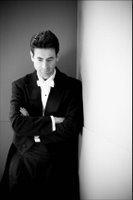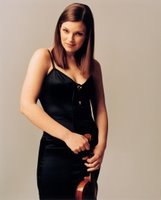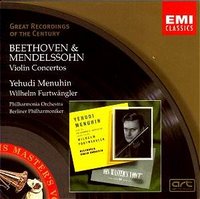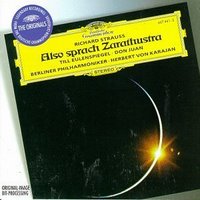May 5, 2006 Friday
Yakov Kreizberg/Conductor
Johann Strauss, Jr. Emperor Waltz
Felix Mendelssohn Concerto in E minor for Violin and Orchestra
Janine Jansen/Violin
Intermission
Richard Strauss Also sprach Zarathustra
Johann Strauss On the Beautiful Blue Danube
 When I got the program note, I immediately noticed that PSO had changed the title of the concert from “Shall we dance” to “Epic Masterpieces” at the last moment. It is odd to link Johann Strauss and Richard Strauss on one night. It seemed that previously PSO’s marketing strategy is to emphasize on those Waltzes. Its posters featured violinist Janine posing with her graceful slender body slightly curved. However, for some serious classical music lovers (especially those subscribers) the once minority-taste Bruckner and Mahler are giantified and for the same reason, Richard Strauss is more appreciated by connoisseurs than caricatured dance music composers. Thus, it seemed that changing the title to “Epic Masterpieces” added much weight to the perspective view of the concert.
When I got the program note, I immediately noticed that PSO had changed the title of the concert from “Shall we dance” to “Epic Masterpieces” at the last moment. It is odd to link Johann Strauss and Richard Strauss on one night. It seemed that previously PSO’s marketing strategy is to emphasize on those Waltzes. Its posters featured violinist Janine posing with her graceful slender body slightly curved. However, for some serious classical music lovers (especially those subscribers) the once minority-taste Bruckner and Mahler are giantified and for the same reason, Richard Strauss is more appreciated by connoisseurs than caricatured dance music composers. Thus, it seemed that changing the title to “Epic Masterpieces” added much weight to the perspective view of the concert. Nevertheless, Strauss’ waltzes were the first few pieces I became familiar with when classical music in China was confused with Richard Clayderman’s piano. For years China’s Central TV station has been broadcasting the annual Vienna New Year’s Concert live. No sooner had my family finally got a colored-TV than I began to get bored of the concert even though it happens only once a year. The freshness fades away after the first few waltzes and even in each waltz the music is filled with several melodies which seem to never grow. Moreover, it has been institutionalized to a social event with special etiquettes. Everything is predictable: music, audience and even who would host the event from TV station.
Nevertheless, Strauss’ waltzes were the first few pieces I became familiar with when classical music in China was confused with Richard Clayderman’s piano. For years China’s Central TV station has been broadcasting the annual Vienna New Year’s Concert live. No sooner had my family finally got a colored-TV than I began to get bored of the concert even though it happens only once a year. The freshness fades away after the first few waltzes and even in each waltz the music is filled with several melodies which seem to never grow. Moreover, it has been institutionalized to a social event with special etiquettes. Everything is predictable: music, audience and even who would host the event from TV station.During the pre-concert tutorial, WQED Classical program producer Jim Cunningham talked about those waltzes with a retiring violist in the orchestra. Although mostly people think them light, a lot of conductors take music seriously including former music director of PSO Mariss Jansons. If it is true that only those Viennese knows the essence of Waltz, then Yakov Kreizberg definitely has some advantages since he holds the post of Principal Guest Conductor of the Vienna Symphony Orchestra. Before the concert, he talked a joke of Leonard Bernstein’s conducting VPO. Every member of VPO claimed to master the technique to play those waltzes and unfortunately they differ from each other. Then Mr. Bernstein took up the rein of the orchestra and declared that it had to be performed only in HIS way. “Although it looks easy,” Mr. Kreizberg said,” they are only easy in that it is easy to play them BAD.”
It turned out that his statement was quite right. The Russian-born conductor seemed to be bothered by the concert’s grand title and treated Emperor Waltz like Tchaikovsky’s 1812 Overture. There was something that was going to explode from him but couldn’t find its way to leak out. His torso was tight and his arm movements ungainly. Correspondingly, the orchestra lost its luster in string and exaggerated its brass and percussion. (Actually PSO’s sound has become less and less refined after Mariss Jansons’ leaving and only a few
 conductors like Peter Oundjian, Charles Dutoit and Andrew Davis have succeeded in meliorating its sound balance.) Yakov Kreizberg succeeded in making dynamics in some sections but failed to attain easy-going rhythms.
conductors like Peter Oundjian, Charles Dutoit and Andrew Davis have succeeded in meliorating its sound balance.) Yakov Kreizberg succeeded in making dynamics in some sections but failed to attain easy-going rhythms.Janine Jansen came onto the stage with the overheated atmosphere in the air. Her 1727 Stradivari “Barrere” has exceptional beautiful muscular sound, especially in lower register its sound is abundant and extensive while still keeps sweet tone. The Stradivari Society which funded the extended loan for Janine sets the goal to help artists find the most suitable instruments for them. The Dutch violist is taller than conductor and has beautiful long arms to match the great instrument. Unfortunately, they two didn’t match Mendelssohn’s Violin Concert.
Hanslick once said: “there are four violin concertos in German repertoire (Beethoven, Brahms, Bruch and Mendelssohn). The sweet and most inward belongs to Mendelssohn.” I attended a concert last year in Chicago and listened to Znaider’s performance of the same piece. It was sweet, limpid, meditative,
 and unmannered with sheer beauty. Yehudi Menuhin’s elegant and vivacious performance with Furtwangler is my favorite. It is as mind-freshening as walking in late spring breeze. However, if the virtuoso in violin is eliminated by Mendelssohn in favor of purity and beauty in the piece, Janine tried to rebuild virtuoso and glamour through her rapacious interpretation. My friend said he liked her performance in that she played precisely and didn’t miss notes even though she played it loud and rush. I can’t agree with it more. However, for me, the unwieldy outward performance, precise and passionate as it was, secretly betrayed Mendelssohn and left me untouched.
and unmannered with sheer beauty. Yehudi Menuhin’s elegant and vivacious performance with Furtwangler is my favorite. It is as mind-freshening as walking in late spring breeze. However, if the virtuoso in violin is eliminated by Mendelssohn in favor of purity and beauty in the piece, Janine tried to rebuild virtuoso and glamour through her rapacious interpretation. My friend said he liked her performance in that she played precisely and didn’t miss notes even though she played it loud and rush. I can’t agree with it more. However, for me, the unwieldy outward performance, precise and passionate as it was, secretly betrayed Mendelssohn and left me untouched.The concert was saved in the second half by Richard Strauss “Also sprach Zarathustra” because that’s totally new experience to me. I am not a fan of Richard Strauss and seldom listen to this piece even though I enjoy so much of the first movement thanks to Stanley Kubrick and Karajan’s famous DGG recording. The title borrowed from Nietzsche doesn’t instill philosophical depth into the music; instead Straus
 s cleverly chose some headings to describe the mood in music. The Dance song reminded me Straussian waltzes in the first half but the orchestration more Wagnerian. Mr. Kreizberg finally found his way to explode and shine and the whole orchestra responded promptly.
s cleverly chose some headings to describe the mood in music. The Dance song reminded me Straussian waltzes in the first half but the orchestration more Wagnerian. Mr. Kreizberg finally found his way to explode and shine and the whole orchestra responded promptly. 
No comments:
Post a Comment